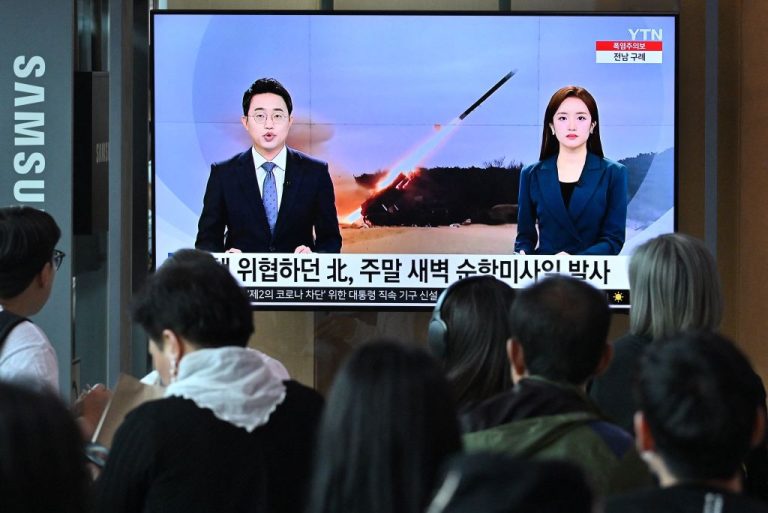Japan and the United States will work together on a new anti-hypersonic missile interceptor, a source familiar with the situation shared with the Japanese newspaper Asahi Shimbun.
Hypersonic cruise missiles (HSM) and hypersonic glide vehicles (HGVs), due to their speed and agility, are considered a warfare game changer and are currently being developed by China, North Korea, and Russia, potentially giving these countries a strategic advantage in case of an armed conflict.
It is challenging to neutralize hypersonic missiles because they move at speeds greater than Mach 5 (five times the speed of sound), change course abruptly, and fly at high altitudes.
While many nations, including Japan, are encouraging the study and development of hypersonic weapons, China is thought to have the most sophisticated technology in this area.
In 2021, China tested a hypersonic missile that circled the earth and struck “close enough” to its target, according to U.S. military officials.
Japan-US-Korea cooperation
Success
You are now signed up for our newsletter
Success
Check your email to complete sign up
The source said the two governments would announce the missile development plan when the two countries are slated to meet bilaterally on Aug. 18 on the sidelines of the Japan-U.S.-South Korea summit hosted by President Biden at Camp David, the presidential retreat in Maryland.
U.S. President Joe Biden, Japanese Prime Minister Fumio Kishida, and South Korean leader Yoon Suk-yeol will be looking to “institutionalize” their ties, according to various reports.
The initiative will be organized against the backdrop of North Korea’s ever-improving nuclear and missile programs and China’s growing military strength. Both topics will prevail on the agenda.
READ MORE:
- Japan Issues Strategy Paper Calling Out Chinese Military Ambitions in the Pacific
- Japan Would Probably Aid Taiwan With Equipment or Logistics, Defense Minister Says
- US Soldier Detained for Assaulting South Korean National Defects to North Korea
- Amidst Beijing’s Aggression in the South China Sea, US Hopes to Cooperate with ASEAN Nations
In addition, the powers intend to agree to more frequent joint military exercises around the Korean Peninsula, three-way get-togethers at least once a year, and enhanced intelligence sharing, including actual figures on North Korean missile launches.
U.S. Secretary of State Antony Blinken appeared hopeful when he spoke on Tuesday (Aug. 15) in Washington after an online meeting with his Japanese and South Korean counterparts.
“I think what you can expect to see coming out of this summit is a collaboration on a trilateral basis that is further institutionalized in a variety of ways, to include regular meetings at a variety of levels — senior levels in our governments,” Blinken said, according to the outlet.
“Japan and South Korea are core allies — not just in the region, but around the world,” he added.
Without directly mentioning China or Taiwan, Blinken described the U.S.-Japan-South Korea trilateral partnership as “part of our broader efforts to revitalize, to strengthen, to knit together our alliances and partnerships — and in this case, to help realize a shared vision of an Indo-Pacific that is free and open, prosperous, secure, resilient and connected.”
An ‘Asian NATO’?
In a similar vein, Japanese officials, like Japanese Minister of Defense Ino Toshiro last month, on several occasions have made it clear that “it’s very possible” that his Japan would render aid to Taiwan in the event of a Communist Chinese invasion.
Beijing, on its part, did not fail to catch the bait and shot back by means of the Communist Party mouthpiece, Global Times, in an editorial on Aug. 6 lambasting the newest developments.
“On the surface, the U.S., Japan, and South Korea are under the banner of ‘countering North Korea’s growing nuclear threat,’ but in fact, it has always been (the) U.S.’s desire to build a ‘mini-NATO-style’ trilateral military alliance in Northeast Asia,” the piece read.
Christopher Johnstone, a former National Security Council director for East Asia under Biden and currently a Japan expert at the Center for Strategic and International Studies think tank elaborated on the possibility of a NATO-type collective Article 5-type of response, which states that an attack on one is an attack on all.
The three leaders emphasized “that security among the three countries is linked and that some measure of threat to one is a threat to all,” Johnstone said, according to Asahi.
“Even though it will fall far short of Article 5 language, this kind of language would be a big deal and an important symbol that these alliances are coming together,” Johnstone said.

















